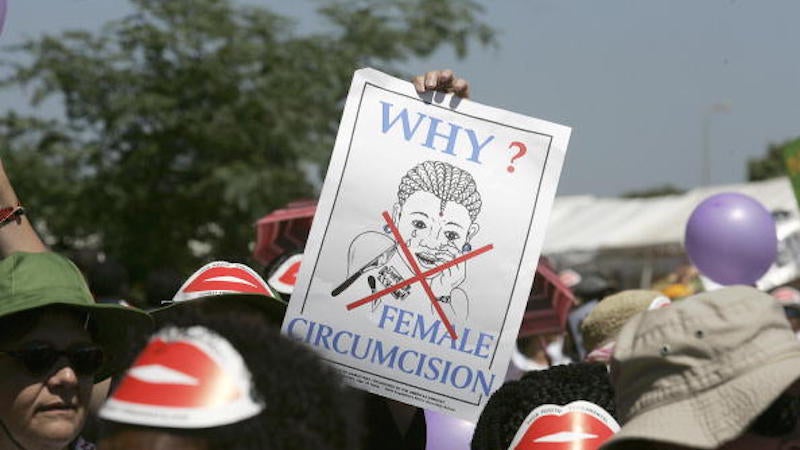
On Sunday, Mayar Mohamed Mousa, a 17-year-old Egyptian girl, died from complications following an illegal female genital mutilation surgery. CNNreports that Mousa and her twin sister were operated on by a registered physician in Egypt’s Suez province. Mousa’s twin sister survived the surgery, but Mayar likely died from blood clotting, according to Dr. Lotfi Abdel-Samee, the health undersecretary for the region.
Abdel-Samee said that state prosecutors are investigating both the doctor and the hospital. The surgery, which was banned in Egypt in 2008, took place at El Canal National Hospital, which authorities have subsequently shut down. According to CNN, Mousa’s mother, who is also a nurse at El Canal, denied that her daughters were at the hospital for FGM, claiming that Mousa was admitted for a different procedure:
The incident was discovered by a health inspector who was called to check on the girl’s death and found, after closer evaluation, that medical staff had illegally [performed] FGM.“This is part of the tragedy,” Abdel-Samee said. “May god give her the strength to overcome the passing of her daughter but this is another issue. Parents won’t acknowledge or admit this is happening. But it did happen.”
Though Egypt banned FGM, according to the United Nations, the practice is still common in the country, fueled, in part, by a long cultural history. A 2013 UNICEF report said that nearly 27.2 million Egyptian women and girls had undergone the procedure. A vast majority of those surgeries are still performed by licensed medical professionals in clinics and hospitals; in that respect, Mayar Mousa’s experience was typical.
Yet the ban on the procedure is relatively new. Both Abdel-Samee and the United Nations stressed that while the numbers of women who have undergone the procedure remain high, they are beginning to fall. CNN notes that, according to the Egyptian Ministry of Health, “the percentage of girls aged 15 to 17 who have had the procedure has dropped from 74.4% in 2008 to 61% in 2014.”
In a statement, the U.N. emphasized that there are no medical or religious reasons for FGM and acknowledged that, “there is still a long way to go.” The statement added, “this harmful practice that violates the rights of women and girls, can have long-lasting physical and psychological implications and can lead to injury and death.”
The U.N. also called for a review of Egypt’s enforcement of the law, “to ensure the rights of women and girls are fully protected.” That sentiment was echoed by human rights campaigners in the country. Dalia Abdelhameed, an officer at the Egyptian Initiative for Personal Rights, told CNN that “criminalization isn’t enough,” adding that the country needs to also “confront the root causes that propel the families to circumcise their daughters in hopes of controlling their sexual desires.”
Image via Getty.
No comments:
Post a Comment